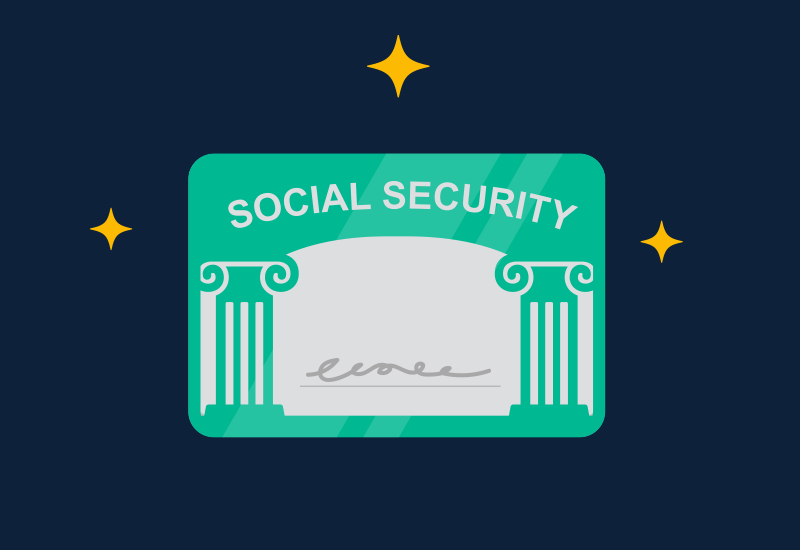Can I Change My Child’s Social Security Number? Parents’ Options Explained

Start Building Your
Child’s Credit
“Can I change my child’s Social Security number?” is a question that, unfortunately, is more common than you think. Finding out that someone has compromised or stolen your child’s identity is a distressing situation to find yourself in.
While you’re certainly not alone, you might panic and decide to change your child’s Social Security number (SSN) to restore and protect their identity. Whether this is possible depends on the individual, and this article will outline the conditions under which the Social Security Administration (SSA) is willing to issue a new number.
You’ll also learn what other steps you can take to remediate SSN or identity theft and minimize the risk of it happening again.
Is It Possible To Get a New Social Security Number?

An SSN is typically permanent because it’s used to track important information throughout the holder’s life, including the following:
- Lifetime earnings
- Social Security benefits
- Federal loans
- Credit history
It’s among the most crucial identifiers, so the SSA is quite strict when it comes to changing it. There are only five scenarios in which the SSA might issue a new number:
- Multiple people have been assigned the same number
- Family members have been issued sequential numbers, which is causing confusion
- The holder is being abused, or their life is in danger
- There are cultural or religious objections to specific digits in the SSN
- The individual is suffering ongoing harm as a result of identity theft, which no other remediation option can resolve
Note that the SSN change might not be approved only because a Social Security card is lost or stolen. Identity theft on its own may not be enough to let you request a new number—you must provide proof of recurring damage caused by the theft and show that you’ve exhausted all other options.
How To Get a New Social Security Number After Identity Theft
If your child is eligible for a new SSN, you can request it the same way you’d change your own. The only difference is that you must provide proof of custody so that the SSA knows you’re legally allowed to request the change.
An SSN replacement must be done in person. You can use the SSA’s locator to find the nearest office, after which you should schedule a meeting.
Make sure to bring your child with you and gather all the necessary documentation, most notably:
- Identification documents for you and your child (photo ID, driver’s license, etc.)
- Reports from relevant authorities confirming and elaborating on the theft
- Proof of custody
- Proof of citizenship/residence
The SSA will guide you through all the necessary steps, which may vary depending on your situation. Once you’ve filled out the necessary forms, your child should receive a new Social Security card and number.
Limitations of an SSN Change
If your child’s identity has been stolen, changing their SSN may not be enough to resolve the issue. The SSA states that if the theft resulted in credit problems, Social Security can’t fix this. Your child would only get a new identifier, but you’d still need to deal with any consequences of the theft.
The SSA recommends contacting the FTC and reporting fraud through their identity theft platform. They’ll give you a recovery plan and walk you through the necessary steps if you create an account.
You should also contact the three major consumer credit bureaus:
Another important step is to check if your child has a credit profile, which would mean that someone has obtained loans in their name. The only exception is if you’ve added your child as an authorized user of your credit card, in which case their credit profile might be legitimate.
Note that identity fraud isn’t always financially motivated. There are many stories of children’s identities being used for various crimes, so you’ll need to assess the specifics of the SSN theft and act accordingly.
What To Do After Changing the SSN

After your child has gotten a new SSN, you should take the necessary steps to keep their identity safe. Use the following precautions to reduce the risk of ID theft:
- Store the Social Security card safely
- Consider a security freeze
- Take advantage of identity monitoring services
Safeguard Your Child’s SSN
When you receive your child’s Social Security card, store it in a safe place and make sure it’s not easily accessible. The SSA advises against carrying the card around routinely, so don’t take it out of the house unless necessary.
As your child grows up, teach them to do the same and keep their private information to themselves. One of the main reasons fraudsters target children is that they’re impressionable, so instill a healthy dose of skepticism in your child. Make sure they reach out to you if anyone asks for their SSN, even the people they know.
Determine if a Security Freeze Makes Sense
Freezing a child’s credit profile is a popular way for parents to try to prevent financial fraud against their children. A frozen credit profile can’t be accessed by new lenders, which can prevent fraudulent accounts in the child’s name.
The problem is, the child can’t build a legitimate credit history while the freeze is active. This might be an issue if your child has entered their teens and you want them to get a head start by building credit early.
Besides, requesting a credit freeze can be time-consuming—you must do it with each credit bureau separately by filling out appropriate forms and mailing them alongside the necessary documentation to the following addresses:
| Credit Bureau | Mailing Address |
| Experian | Experian Security Freeze, P.O. Box 9554, Allen, TX 75013 |
| Equifax | Equifax Information Services LLC, P.O. Box 105788, Atlanta, GA 30348-5788 |
| TransUnion | TransUnion, P.O. Box 380, Woodlyn, PA 19094 |
If you want to avoid these limitations while keeping your child’s identity safe, ID monitoring services can be a solid option.
Sign Up for Child Identity Monitoring
Keeping your child’s identity safe is a serious endeavor and often not a one-person job. You’d need to make it an ongoing part of your already busy life and stay on a constant lookout for red flags.
To save yourself a significant amount of time and energy, you can sign up for paid monitoring services. This way, you can outsource ID security to a team of professionals, thereby drastically reducing the chances of identity theft.
You can choose from various providers, though most require a monthly subscription—and an average parent is already swamped with them. If you need an option that won’t stress your budget while providing comprehensive security, check out FreeKick.
Use FreeKick To Safeguard Your Family’s Identities
Identity theft is so widespread that a child’s identity is stolen every 30 seconds, making identity protection services invaluable. That’s where FreeKick by Austin Capital Bank comes in—this two-in-one platform protects your child’s identity and builds credit for them.
How FreeKick’s Protects Your Family’s Identities
FreeKick offers identity protection services for minors, adult children, and parents, making it a comprehensive identity protection package for your whole family. For minors, FreeKick offers the following services:
- Credit profile monitoring
- Social Security number (SSN) monitoring
- Dark web monitoring for children’s personal information
- Up to $1 million identity theft insurance
- Full-service white-glove concierge credit restoration
- Sex offender monitoring—based on sponsor parent’s address
For adult children and parents, FreeKick offers:
- Credit profile monitoring
- SSN monitoring
- Dark web monitoring for personal information
- Up to $1 million identity theft insurance
- Full-service white-glove concierge credit restoration
- Lost wallet protection
- Court records monitoring
- Change of address monitoring
- Non-credit (Payday) loan monitoring
- Free FICO® Score monthly
- FICO® Score factors
- Experian credit report monthly
How FreeKick Builds Credit
FreeKick builds credit for children aged 13 to 25 in three simple steps:
- Create an Account—Sign up on FreeKick.bank and choose a deposit that suits your budget
- Set It and Forget It—FreeKick will start building 12 months’ worth of credit history for your child
- Keep Growing—After 12 months, close the account without any fees (or continue building credit for your child for another year)
These steps give your child the opportunity to have five years’ worth of credit history when they turn 18. This will help them save $200,000 during their lifetimes by giving them access to better loan terms and other financial benefits.
FreeKick Pricing
FreeKick offers two pricing plans:
| FDIC-Insured Deposit | Annual Fee |
| $3,000 | $0 (Free) |
| No deposit | $149 |
Both plans offer:
- Credit building for six children aged 13 to 25
- Identity protection for two parents and six children aged 0 to 25
Secure your family’s identity and financial future—sign up for FreeKick today.